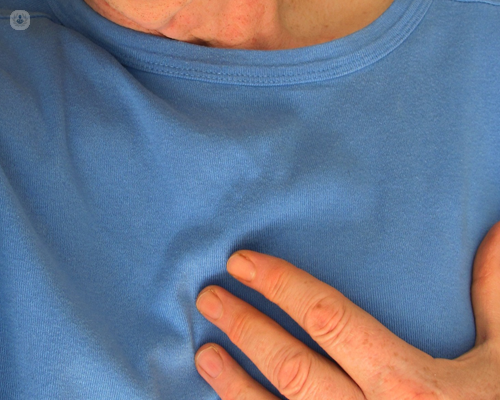How to investigate palpitations
Escrito por:Experiencing palpitations can be a cause for concern, and you may be wondering how they're diagnosed.
Leading consultant cardiologist and electrophysiologist Dr Malcolm Finlay goes into expert detail to explain how palpitations are medically investigated, in this informative article.

What are palpitations?
Palpitations are one of the most common symptoms that people come to me complaining of, and the causes can hugely vary.
So, people without any heart rhythm problems sometimes get palpitations. For example, when people are very nervous or there's a hormonal upset, people can have a sensation of the normal heartbeat but equally, some palpitations are caused by abnormal heartbeats that require treatment. It's often quite hard to really delve into it and get the firm diagnosis unless someone comes to you whilst those palpitations are happening.
I think the key thing is to get symptom-arrhythmia correlation. What that means, is that we need to get a tracing of the heart, a recording of the heart activity whilst the symptoms are ongoing. With that, we can relate the symptoms to the underlying heart rhythm disorder.
How are palpitations that relate to an underlying heart rhythm disorder diagnosed?
The first standard thing is to do a 12 lead ECG, a standard electrogram recording of the heart. That's usually done in clinic but frankly, it's very rare that we pick up an abnormal rhythm the first time we do that.
Then we come to the ideas of 'well, shall we do a recording for the whole day and night?'. This would be a 24-hour ECG recording, which is the old 24-hour Holter monitor. The problem with these, is that when you get electrodes put on your chest and are told to go away and 'have some palpitations', usually people relax a bit and don't do the same activities they would normally. It's pretty rare, actually, that you get any heart rhythm abnormalities based on a single 24-hour tape.
We have methods of doing longer recordings, either for three days or for a full week, with either standard ECG stickers or with more modern devices. These are essentially a sticky patch with a recording device that goes on the chest. That's much more likely to pick up if there are any abnormal rhythms, and importantly with that, we get the person to say whether or not they had symptoms whilst that recording was taking place.
Self-recording capabilities
One of the really big things we've got now, is the ability for people to monitor their own heartbeat with their smart watch or own Fitbit or ECG monitor. That really means that we're not just having to record the ECG via the hospital; people are able to record it themselves when they get their own palpitations.
Even so, if people have a sudden onset or very quick palpitations, or if they have other symptoms, for example if they've been blacking out, they aren't able to form their own heart rhythm recording when they've got the symptoms. In those circumstances we need something a bit more special.
Implantable loop recorders
This special thing would be tiny, implantable recorders called implantable loop recorders which we can put in, in the clinic. These are tiny microchips that essentially go under the skin. They're about the size of a pen lid, and they have a battery that lasts two, three or even four years long, and they record the heart rhythm the entire time.
The most modern ones can connect to your smartphone, or be read directly by the hospital via a remote system. That means, in people with what we think could be a serious palpitation which is happening infrequently, we're able to get really excellent tracings the entire time. They've been huge advance in our diagnosis.
The importance of heart imaging
One other thing is that we need to make sure people's hearts are structurally normal. Abnormal heart structures can give rise to palpitations, and so doing some heart imaging is absolutely critical. That can either be:
- an echo scan, or an;
- ultrasound scan of the heart.
Or, it could be something more complex such as;
- a cardiac MRI scan or;
- a cardiac CT scan.
Once we've got those, we can really have a very good idea of what is the likely heart rhythm problem.
Then, as a final step, we would plan to do an invasive study called an electrophysiological study. That's a procedure where you would come into hospital and would perform an actual invasive diagnosis of the heart rhythm. That's bypassing several wires to the top of the leg to the heart, and we take direct electrical readings from the heart. It's actually a very quick and safe procedure to do, and the big advantage is that we're often able to apply ablation treatment at the same time as doing that investigation.
So, as you can see, there are numerous ways of investigating palpitations and we're delighted to help if we can.
If you're concerned about palpitations and would like them investigating, you can consult with Dr Finlay via his Top Doctors profile.


